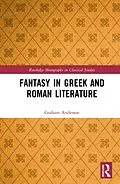Fantasy in Greek and Roman Literature offers an overview of Greek and Roman excursions into fantasy, including imaginary voyages, dream-worlds, talking animals and similar impossibilities. This is a territory seldom explored and extends to rarely read texts such as the Aesop Romance, The Battle of the Frogs and the Mice, and The Pumpkinification of the Emperor Claudius.
Bringing this diverse material together for the first time, Anderson widens readers' perspectives on the realm of fantasy in ancient literature, including topics such as dialogues with the dead, Utopian communities and fantastic feasts. Going beyond the more familiar world of myth, his examples range from The Golden Ass to the Late Antique Testament of a Pig. The volume also explores ancient resistance to the world of make-believe.
Fantasy in Greek and Roman Literature is an invaluable resource not only for students of classical and comparative literature, but also for modern writers on fantasy who want to explore the genre's origins in antiquity, both in the more obvious and in lesser-known texts.
Autorentext
Graham Anderson is Emeritus Professor of Classics in the University of Kent, UK. He has written extensively on ancient fiction and fantasy, including Fairytale in the Ancient World (Routledge, 2000) and Greek and Roman Folklore (2006). He has just completed an anthology of ancient fairy tales for Routledge.
Klappentext
Fantasy in Greek and Roman Literature offers an overview of Greek and Roman excursions into fantasy, including imaginary voyages, dream-worlds, talking animals and similar impossibilities. This is a territory seldom explored and extends to rarely read texts such as the Aesop Romance, The Battle of the Frogs and the Mice, and The Pumpkinification of the Emperor Claudius.
Bringing this diverse material together for the first time, Anderson widens readers' perspectives on the realm of fantasy in ancient literature, including topics such as dialogues with the dead, Utopian communities and fantastic feasts. Going beyond the more familiar world of myth, his examples range from The Golden Ass to the Late Antique Testament of a Pig. The volume also explores ancient resistance to the world of make-believe.
Fantasy in Greek and Roman Literature is an invaluable resource not only for students of classical and comparative literature, but also for modern writers on fantasy who want to explore the genre's origins in antiquity, both in the more obvious and lesser known texts.
Inhalt
Preface
List of Abbreviations
1 Introduction
Part One: Themes of Fantasy
2 Otherworldly Conversations in Antiquity
3 Talking Animals, Monstrous Creatures
4 Fantastic Voyages, Other Communities
5 Dreams, Apparitions, Horror
6 Some Fantastic Aspects of Myth
7 The Ultimate Myth: Metamorphosis
8 Bizarre Banquets, Topsy-Turvy Tables
9 Planting the Phallus: Sexual Fantasy
Part Two: Divergent Imaginations
10 Verse Fantasy into Prose
11 Inventing the Past in Homer and Philostratus
Part Three: Fantastic Texts
12 Old Comedy and Lucian
13 Getting into Heaven: Icaromenippus and Apocolocyntosis
14 The Summation of Fantasy: Lucian's True Histories
Part Four: Consumers of Fantasy
15 Narrators and Audiences for Fantasy
16 Some Approaches, Ancient and Modern
17 Conclusions
Appendix: Some Fantastic Nonsense
Bibliography
Index
